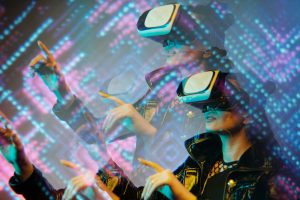Role-Playing and Simulation: Experiential Learning in 2025
In today’s fast-paced world, traditional methods of learning have become outdated and inadequate in preparing individuals for the ever-evolving job market. The rise of technology and its integration in various industries has paved the way for new and innovative ways of learning, ultimately bridging the gap between theory and real-world experience. This comes in the form of role-playing and simulation, where hands-on learning through immersion allows individuals to gain a deeper understanding of concepts and skills. With the continuous advancements in technology, the potential for experiential learning through role-playing and simulation is boundless, and its impact on education in 2025 is undeniable.
The Rise of Role-Playing and Simulation in Education
Traditional methods of learning, such as lectures and textbooks, have long been the norm in education. However, the shortcomings of these methods have become increasingly apparent as the demands of the job market continue to shift. In response, educators have turned to role-playing and simulation as a means to enhance the learning experience.
Role-playing, or the act of assuming a particular role or character, allows individuals to gain first-hand experience in different scenarios, ranging from business negotiations to medical emergencies. This not only promotes critical thinking and problem-solving skills, but also fosters empathy and teamwork, which are essential in any workplace. Similarly, simulation, which involves recreating real-world situations using technology, provides a safe and controlled environment for individuals to practice and apply their knowledge and skills.
The Benefits of Experiential Learning through Role-Playing and Simulation
1. Bridging Theory and Practice
One of the biggest challenges in traditional learning is the disconnect between theory and practice. Rote memorization of concepts and theories only scratches the surface of understanding. Role-playing and simulation, on the other hand, bridge this gap by allowing individuals to experience and apply what they have learned in a practical setting. This results in a deeper understanding and retention of knowledge.
2. Encouraging Active Learning
Active learning, or the process of engaging and applying knowledge, has been proven to be more effective in promoting learning and retention. With role-playing and simulation, individuals are not just passive recipients of information, but active participants in the learning process. This allows for a more dynamic and engaging learning experience.
3. Developing Lifelong Skills
Role-playing and simulation also provide opportunities for individuals to develop skills that are crucial in the workforce. From communication and problem-solving to adaptability and teamwork, the transferable skills gained through experiential learning can be applied in various settings and roles.
The Future of Education: Role-Playing and Simulation in 2025
The potential for role-playing and simulation in education is boundless, and its impact will continue to shape the future of learning in 2025 and beyond. With the continuous advancements in technology, the possibilities for immersive and interactive learning experiences are endless. Virtual and augmented reality can provide even more realistic and engaging simulations, while artificial intelligence can create personalized learning experiences tailored to individual needs.
Additionally, the integration of role-playing and simulation in various industries and fields of study will continue to expand. From healthcare and finance to engineering and law, experiential learning will become an essential component in preparing individuals for their chosen careers.
The Key to Success: Google SEO-Optimized Content
As role-playing and simulation gain prominence in education, it is crucial for educators and content writers to optimize their online content for Google SEO. With the majority of the population turning to the internet for information, having a strong online presence is necessary to reach and engage with a wider audience.
To ensure that your content ranks high on Google, it is important to use relevant keywords, proper headings, and high-quality content. Incorporating keywords such as “role-playing”, “simulation”, and “experiential learning” in your content will make it more searchable and increase its visibility.
The Future of Learning is Here
In conclusion, the integration of role-playing and simulation in education has proven to be a game-changer in bridging the gap between theory and practice. Its benefits in promoting active learning and developing essential skills will continue to shape the future of education in 2025 and beyond. It is up to us, as educators and content writers, to optimize our online content and fully embrace the potential of role-playing and simulation in revolutionizing the way we learn.







